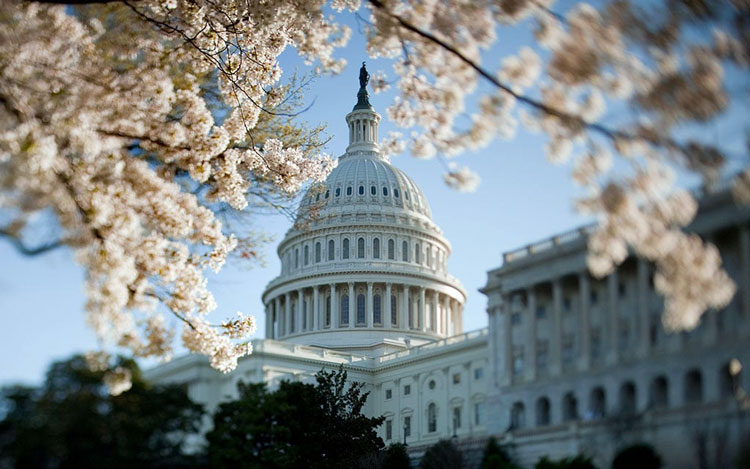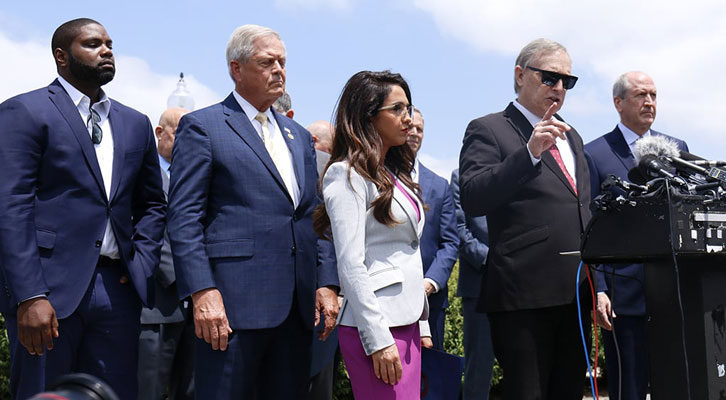Photo By Lauren Irwin/Cronkite News: Rep. Andy Biggs, R-Gilbert, and other conservative Republican members of the House at a news conference Tuesday opposing the debt-ceiling bill that passed the House Wednesday on a bipartisan vote.
Lauren Irwin/Cronkite News
WASHINGTON – The House Wednesday approved a debt-limit bill that was almost universally disliked, but which some lawmakers said they would vote for because failing to do so could spark a default on the nation’s debt.
The measure would lift the $31 trillion debt ceiling, allowing the government to borrow so it can pay its bills just days before the Treasury said it would run out of money. In exchange for lifting the cap, the proposal includes limits on some spending, new restrictions on welfare programs, and other GOP-demanded cuts.
The Fiscal Responsibility Act scrambled loyalties on both sides of the aisle, with progressive Democrats saying it goes too far and conservative Republicans saying it does not go far enough.
The final vote was 314-117, with 149 Republicans and 165 Democrats voting in favor of the measure. The same held true for Arizona’s delegation, where party lines were blurred by supporters and opponents of the bill.
Rep. Eli Crane, R-Oro Valley, was an early opponent of the deal, which he called “an epic betrayal of the American people.”
“The people of #AZ02 did not send me to DC to be complicit in the managed decline of this country,” Crane tweeted Monday. “We’re nearing $32 trillion in debt. The proposed deal guarantees that we will add at least another $4 trillion by 2025. That’s insanely foolish. I’m a hard no.”
But fellow Republican Rep. Juan Ciscomani of Tucson tweeted Wednesday that he would vote for the bill because it was the best available option.
“The alternatives are a clean lift (of the debt ceiling) or defaulting on our obligations – two options I’m not willing to entertain,” Ciscomani tweeted. “I was elected to responsibly govern, and what Republicans have negotiated is a step in the right direction.”
Ultimately, Ciscomani was joined by Rep. David Schweikert, R-Fountain Hills, and Democratic Reps. Greg Stanton and Ruben Gallego of Phoenix in support of the bill. Crane was joined by fellow Arizona Republican Reps. Andy Biggs of Gilbert, Debbie Lesko of Peoria and Paul Gosar of Bullhead City, and Democratic Rep. Raúl Grijalva of Tucson in voting against the measure.
The measure now goes to the Senate just days before June 5, what Treasury Secretary Janet Yellen has called the “X-date” when the government might no longer have money to pay its bills without the ability to borrow more. The Senate is expected to meet Thursday to consider the measure.
The 99-page bill was the result of weeks of negotiations between the White House – which had initially insisted that the debt ceiling be lifted without conditions – and House Republicans, who said they would not approve more borrowing without cuts to federal spending. The final proposal was delivered over the holiday weekend.
It would suspend the country’s debt ceiling until Jan. 1, 2025, in exchange for a variety of cuts to federal spending.
Those include rescinding $30 billion in unspent COVID-19 relief funds – including $400 million from the Centers for Disease Control and Prevention’s Global Health Fund – and taking back $20 billion of the $80 billion in new funding for the IRS over the next decade.
The deal also caps non-defense discretionary spending for two years, which means spending for housing and education programs, for example, will remain unchanged in 2024 with a slight increase in 2025. The bill increases spending by 3% on medical care for veterans who were exposed to hazardous materials.
Republicans also negotiated policy changes as part of the deal with the White House. The bill would impose new work requirements for recipients of the Supplemental Nutrition Assistance Program – or food stamps – and Temporary Assistance for Needy Families.
President Joe Biden held firm on his plan to cancel student debt for some borrowers, but he did agree to end the current freeze of monthly student loan payments as early as the end of the summer.
The White House also agreed to GOP demands to speed up permitting for environmental and energy-related projects by limiting review to one federal agency to approve them.
Grijalva, the ranking member of the House Natural Resources Committee, called the proposed rollbacks on environment and energy projects “a slap in the face to Arizonans and people across the nation.”
While Grijalva said the permitting changes went too far, Lesko said the changes to SNAP work requirements did not go far enough, allowing a number of exceptions for homeless individuals, among other concerns.
“Although I appreciate the hard work put into negotiating a debt ceiling deal with the president, I cannot in good conscience vote for the current version of the debt ceiling bill,” Lesko said in a statement.

Many of those who voted for the bill were like Stanton, who said he was voting for it “not because it is perfect, but because it is a bipartisan compromise that will avert economic catastrophe.”
“We cannot allow the full faith and credit of the United States to be used as a political football at the expense of the people we serve,” his statement said.
On Thursday, Arizona’s Democrat Senator Mark Kelly spoke in favor of the agreement.
“Defaulting on the national debt should never be an option. It’s ridiculous that over and over again Washington comes to the brink of wrecking our economy, using the threat of killing countless jobs and driving up costs for families and seniors as a negotiating tactic,” said Senator Kelly. “This agreement is a compromise, which means each side didn’t get everything they want, but the most important part is that it avoids a devastating default. I’ll be voting to pass it and am hopeful that Republicans and Democrats in the Senate can come together quickly to get this done.”










